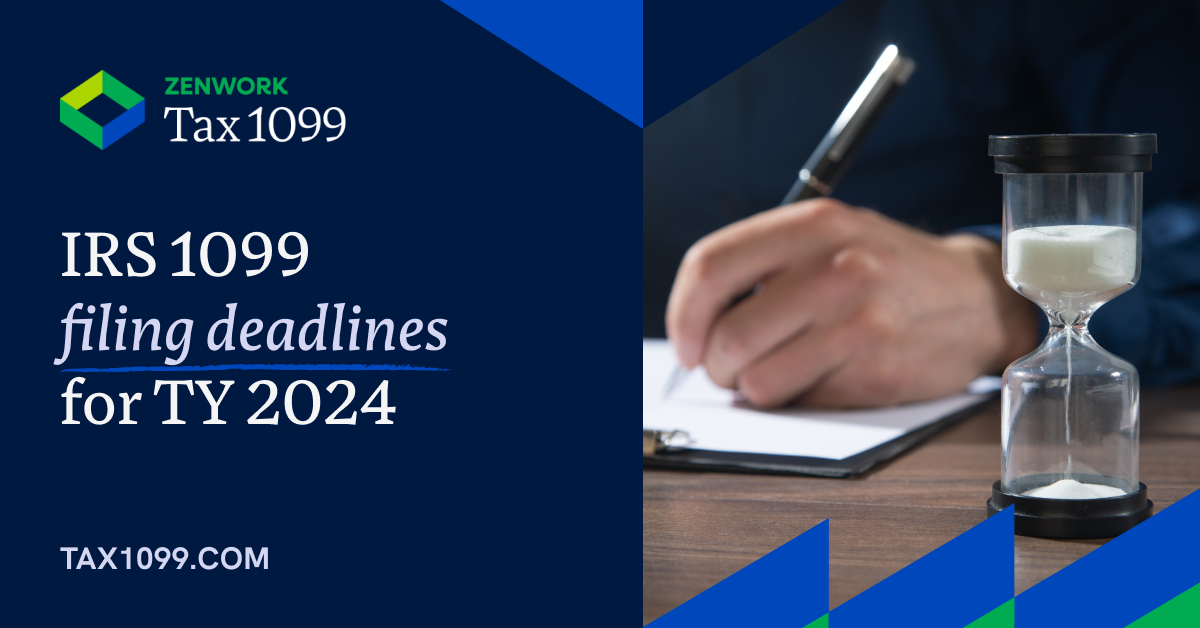The specific IRS Form 1099 filing due date varies based on the type of form and the chosen filing method. The key IRS 1099 filing deadlines are as follows (with some exceptions): by January 31, 2025, individuals and entities must furnish income statements to recipients. The payer must file with the Internal Revenue Service on or before February 28, 2025, if filing on paper, and if the payer has more than 10 forms, must file electronically by March 31, 2025.
Don’t wait until the last minute! Schedule your Form 1099, W-2, & state filings with Tax1099 now.
IRS 1099 Filing Deadlines for 2024 Tax Year:
Form 1099s 1099 Forms are described as a set of tax documents that record various payments received by any taxpayer other than traditional wages. For example, this includes independent contractors, gig workers, or really any other individual who isn’t an employee being reported on a W2. The IRS sets specific deadlines for sending and filing these forms, which both employers and independent contractors must follow.
The most common 1099 form deadlines are:
|
IRS Form
|
1099 Due Date to Recipients
|
Filing to IRS By Mail |
E-Filing to IRS |
| 1099-NEC | January 31, 2025 | January 31, 2025 | January 31, 2025 |
| 1099-MISC |
January 31, 2025 | February 28, 2025 | March 31, 2025 |
| 1099-DIV |
January 31, 2025 | February 28, 2025 | March 31, 2025 |
| 1099-INT
|
January 31, 2025 | February 28, 2025 | March 31, 2025 |
| 1099-R |
January 31, 2025 | February 28, 2025 | March 31, 2025 |
| 1099-A | January 31, 2025 | February 28, 2025
|
April 01, 2025 |
| 1099-B | February 15, 2025 | February 28, 2025
|
April 01, 2025 |
| 1099-C | January 31, 2025 | February 28, 2025
|
April 01, 2025 |
| 1099-G | January 31, 2025 | February 28, 2025
|
April 01, 2025 |
| 1099-K
|
January 31, 2025 | February 28, 2025
|
April 01, 2025 |
| 1099-S | January 31, 2025 | February 28, 2025
|
April 01, 2025 |
| 1099-OID | January 31, 2025 | February 28, 2025
|
April 01, 2025 |
| 5498-SA | May 31, 2025 | May 31, 2025 | May 31, 2025 |
| 1099-PATR | January 31, 2025 | February 28, 2025
|
April 01, 2025 |
| 1097-BTC | On or before the 15th day of the 2nd calendar month after the close of the calendar month in which the credit is allowed | February 28, 2025 | April 01, 2025 |
| 1099-SA | January 31, 2025 | February 28, 2025
|
April 01, 2025 |
| W-2G | January 31, 2025 | February 28, 2025
|
April 01, 2025 |
1099 State Filing Due Dates for the tax year 2024
Most states follow the federal government’s tax deadlines, but they can vary because of different filing rules. So, it’s important to understand the specific regulations of the states where you file.
- Combined State/ Federal Filing:
Some states participate in a combined program with the federal government for reporting 1099s. The IRS shares common 1099 forms, such as 1099-NEC, 1099-MISC, 1099-INT, 1099-DIV, and 1099-R, with these states. This means that businesses do not have to submit these forms separately except under specific conditions.
Most US states, including Alabama, Arizona, California, Hawaii, Mississippi, and Wisconsin, participate in the Combined Federal State Filing (CFSF) program.
-
States with No Filing Requirement:
In some states, you don’t have to worry about filing extra paperwork for common 1099s like 1099-MISC– just file with the IRS, and you’re good to go.
States such as Alaska, Illinois, Nevada, New York, Tennessee, Washington, and Wyoming fall into this category and do not require separate filings for these forms.
-
States with Withheld Taxes
Filing Form 1099s in a handful of states is only necessary if you’ve held back state taxes.
So, if you’re in places like Kentucky, Rhode Island, West Virginia, or Utah, and you’ve done some withholding, get ready to file that Form 1099-MISC.
To check the 1099 requirements for each state, click here.
Filing Requirements for Tax Year 2024
Under recent regulatory changes if you’re filing 10 or more forms in a calendar year of any type, you’re required to file electronically with the IRS. This is a significant change from the previous rule, which mandated electronic filing for more than 250 returns of the same type within a year.
Make things easy for yourself—utilize Tax1099, an IRS-authorized eFiling service platform, to handle these forms hassle-free.



